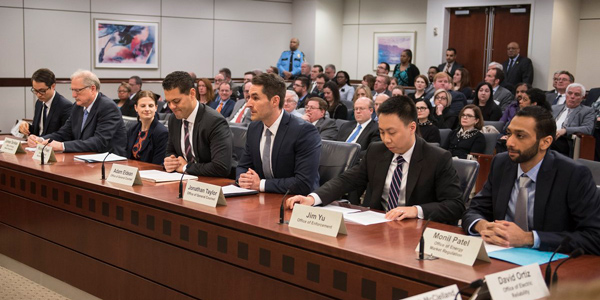By Michael Brooks
WASHINGTON — FERC on Thursday ordered 48 electric utilities to revise their transmission rates to reflect the recently enacted Tax Cuts and Jobs Act, which reduced the corporate income tax rate from 35% to 21%.
The utilities required to file changes — which include Portland General Electric, West Penn Power, New York State Electric and Gas, NorthWestern Corp. and Pacific Gas and Electric — all include a fixed line item of 35% in their transmission tariffs. Most utilities use formula rates that include an annually adjusted input for their tax payments, so they do not need to file any changes, FERC staff said at the commission’s monthly open meeting.
FERC issued its directive in two separate, nearly identical orders: one in which the full commission participated, and the other in which Chairman Kevin McIntyre recused himself. The latter order is addressed to 15 utilities, including several American Electric Power subsidiaries, Baltimore Gas and Electric, Black Hills Power, San Diego Gas & Electric and UNS Electric.
Most of the utilities in the orders have their own docket; the commission grouped three FirstEnergy subsidiaries into one docket and two NV Energy subsidiaries into another.
The utilities are required to file their changes, or show why they should not be required to, within 60 days of the dates of the orders.
FERC also granted two requests to lower transmission rates to reflect the new law: one from Public Service Company of Colorado (ER18-840) and another from multiple MISO transmission owners, including Ameren Illinois, ITC Midwest, Montana-Dakota Utilities and Northern Indiana Public Service Co. (ER18-783).
MLPs, Gas Pipeline NOPR
The commission also issued a revised policy to no longer permit master limited partnerships (MLPs) to recover an income tax allowance in their costs of service (PL17-1).
In its 2016 ruling in United Airlines v. FERC, the D.C, Circuit Court of Appeals found the commission had failed to demonstrate that MLPs were not double recovering when they receive both an income tax allowance and a return on equity based on the discounted cash flow methodology, remanding the case back to FERC.
Reflecting its new policy, FERC issued an order on the remanded case, denying SFPP, a Kinder Morgan subsidiary, an income tax allowance for its West Line, a 515-mile oil pipeline that runs from the Los Angeles Basin to Phoenix, Ariz. (IS08-390).
Shortly after the commission issued its orders, shares for multiple MLPs took a sharp downturn, news outlets reported.
FERC’s revised policy statement also directed oil pipeline MLPs to reflect the elimination of income tax allowance in their Form No. 6 filings, which the commission will use in its 2020 review of the oil index pipeline level.
For natural gas pipelines, FERC issued a Notice of Proposed Rulemaking that would require them to make a one-time informational filing to allow the commission to evaluate whether their rates are just and reasonable under the new tax law and its new policy statement (RM18-11). However, gas pipelines would also be able to simply file reduced rates.
Notice of Inquiry
FERC also opened a broad inquiry into the effects of the tax law on all the industries it regulates (RM18-12).
Commissioners and staff said they were particularly interested in accumulated deferred income taxes — money that companies collect from ratepayers in anticipation of paying income tax — and bonus depreciation, a tax incentive that allows companies to immediately deduct the purchase of certain business properties.
Comments on the Notice of Inquiry are due 60 days after its publication in the Federal Register.




